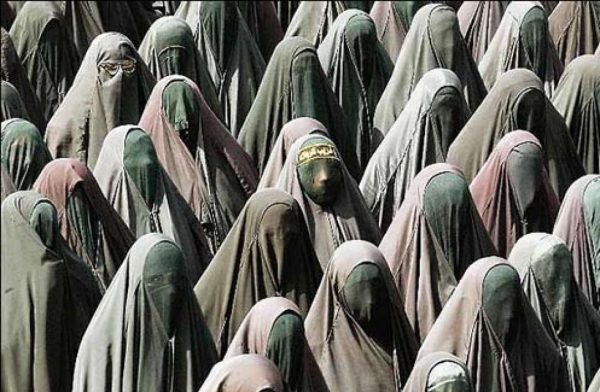Hijab wearing: The controversies, fictions and facts
The World Hijab Day is held on every Feb. 1 to promote religious tolerance, solidarity with Muslim women worldwide, emphasise the religious values of the use of hijab and correct misconceptions about the veil, among others.
Muslims believe that in Islam, hijab (veil) wearing connotes the principle of modesty; and the most visible form of hijab is the head covering that many Muslim women wear.
Hajiya Mutiat Orolu-Balogun, coordinator of Hijab Rights Advocacy Initiative, said in Lagos during the celebration of the day said hijab wearing was an added religious duty for Muslim women and asking them to remove it amounted to discrimination and oppression.
“One thing we all seem to agree on is that violence against women is wrong in all its forms, whether it is physical, emotional or psychological,’’ she said.
The Coalition of Nigerian Muslim Women that organised the 2017 edition of the day with the theme: “#IStandForHijab”, said the theme was a strong message of support and encouragement for hijab users.
The coalition observed that the theme called for advocacy for the right to hijab wearing and solidarity with the wearers.
During the observance, the coalition insisted that wearing hijab was a fundamental right of the Muslim women.
The group noted opposition to the Muslim women’s right to wearing hijab had risen in recent times that should attract the attention of the concerned.
According to it, hijab wearing has become a serious issue in Nigeria following attempts by some schools and government agencies to ban or restrict its use.
“Among issues that dominated public discourse on hijab recently included the Appeal Court lifting of a High Court imposed ban on hijab in Lagos schools by which the court upheld the wearing of hijab as fundamental rights of Muslim women and girls.
“Also in June 2016, a High Court in Osun legalised the use of hijab by Muslim students that generated a lot of controversy,’’ the coalition observed.
Muslim faithful have also observed that public opinion about the Muslim women’s hijab has generated controversies to the extent that some critics believe that hijab wearers are involved in the Boko Haram insurgency in the northern part of the country.
They note further that there is need to state facts about the usage of hijab; more so, when some of the female bombers have been reported to be in veil — hijab— to commit crimes.
Malam Abdulwahab Salami, a cleric, insisted that “hijab is an Arabic word which connotes barrier or partition but with a broader meaning — modest dressing– both males and females’’.
Irrespective of this explanation, cynics have often asked why Islam has made the wearing of hijab somewhat compulsory for women.
According to Salami, Islam introduces hijab as part of the decency and modesty in interaction among members of the opposite sex.
“It is the most appropriate thing to forestall any lust from the opposite sex because men are by nature subjected to lust and inordinate ambition towards the opposite sex.
“Wearing of hijab contributes to the stability and preservation of marriage and family by eliminating the chances of extramarital affairs and compelling men to focus on the real personality of the woman and de-emphasising her physical beauty,’’ he said.
Hajia Aisha Yusuf-Umar, a member of the coalition, nonetheless, opined that focus on constructive engagement with relevant stakeholders and the general public would suffice in addressing the negative perception of wearing of hijab.
“The stance will help to drive the simple message that the hijab is the Muslim women’s and she is the hijab.
“This is the message we will keep spreading through available means until it receives clear comprehension and accommodation and the support of those who believe in this course.
“Hijab gives the Muslim women the freewill, the ability and the choice to contribute to the public space in a way and manner that is more comfortable, unrestricted and in conformity with the values of modesty and responsibility,’’ she said.
Yusuf-Umar called on Nigerians to support and solicit the right to hijab wearing to promote common humanity, encourage development and create harmony in the society.
“It is quite noteworthy that the hijab is receiving the right kind of advocacy and support in many western countries where army and police uniforms have been modified to accommodate the Muslim women’s rights.
“For instance, the U.S. Army has issued a directive allowing Muslim women to wear religious head coverings.
“Canada and Scotland in 2016 also adopted new rules allowing female police officers to wear hijab in an attempt to attract more Muslim women to the profession.
“The Police in Norway and UK also permit wearing the hijab as part of police uniform,’’ she observed.
She pleaded with the media to champion the course of promoting hijab wearing, noting that it would enable the local population to appreciate the universal nature of the need for positive advocacy irrespective of difference in faith or beliefs.
“We seek to reiterate our genuine concern over unnecessary hardship faced by Muslim students, female youth corps members, applicants for national and international identification documents and female employees in the corporate world because of hijab wearing,’’ she said.
Yusuf-Umar, therefore, called on Muslims and others to invest time and resources in understanding and promote the common values for development, security and social justices that would further unite the country.(NANFeatures)




 Premier League
Premier League